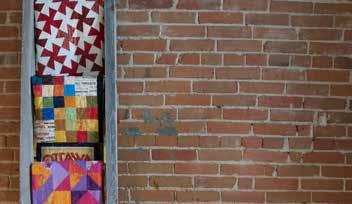
7 minute read
Local man works to
Local man concerned about future of Anishinaabemowin language
KIRK WINTER Municipal Affairs
Advertisement
At least 85 Indigenous languages in Canada are either vulnerable to or facing outright extinction, according to the United Nations Educational Scientific and Cultural Organization (UNESCO). One of those languages is Ojibwe, or Anishinaabemowin, the language spoken locally by the Nishnaabeg of Curve Lake First Nation. If D.J. Fife has his way, this ancient and complex language will not disappear without a fight, but the challenge is great.
“It is a dire time for the language today in Ontario. The language is seriously endangered at Curve Lake. I would say there are perhaps fewer than 20 proficient Anishinaabemowin speakers left in our community,” Fife said. UNESCO concurs, reporting that there may be fewer than 6,000 Ojibwe speakers left in all of Canada.
Fife, 30, and originally from Curve Lake, is by day a park warden at Petroglyphs Provincial Park, home to the historical and spiritually significant Kinomaagewapkong (the Teaching Rocks).
Fife studied Anishinaabemowin throughout elementary and high school, just as many of his peers did, never with any intention of becoming an unofficial spokesperson for language preservation.
“I grew up in Curve Lake,” Fife told the Advocate in a series of telephone and email exchanges. “Most of the people born after 1960 in Curve Lake don’t speak Anishinaabemowin fluently. Most knew some words but didn’t know the language. My mom’s generation forward could understand the language to an extent, but they could not speak it. Despite the fact it was taught in school, you had to pursue it on your own to get really good at it.”
Anishinaabemowin, also called Ojibwemowin and historically known as Ojibwe/Ojibwa or Chippewa, is an Indigenous language spoken from Saskatchewan to Quebec, concentrated around the Great Lakes. It is the heritage language of more than 200,000 people in Canada and the United States. Elders share that the term Anishinaabemowin acknowledges the creation story of the Ojibwe people: “Anishinaabe” means “the spirit that is lowered down from above,” “-mo” refers to expression through speech and “-win” refers to the life energy within, used to do so. Linguists also explain that “-win” is a nominalizer that turns the verb Anishinaabemo (“he/she is speaking the Anishinaabe language”) into a noun.
Residential schools were one of ~ The Canadian the biggest contributors to the loss of the language, Fife said. “There were Encyclopedia (online) certainly active attempts made to demonize the language and culture. My grandparents’ generation was actively punished for speaking the language at school, but the language remained alive in the community. The problem was outside of that tightly knit community the language was not seen as a positive asset.”
Although there was an uptick of interest starting in the 1970s, Fife added, “The overwhelming settler culture and not enough opportunity to use the language as a tool for advancement impacts the interest in learning Anishinaabemowin. You have to want it as a part of your identity. You have to make a point to learn it and many start, but not many have reached a level of fluency.”
D.J. Fife is doing his part to ensure the Anishinaabemowin language survives.
Ojibwe is not a single standardized language, but a chain of linked local varieties, grouped into nearly a dozen dialects. Each dialect (and within dialects, each local variety) differs in details of pronunciation, vocabulary and grammar from the others, with differences between non-adjacent dialects often being great enough to impede understanding between their speakers. Speakers of Ojibwe consider their Through repetition and effort, Fife made his language more than an academic pursuit. “For many years every week language to be precise, descriptive and visual, and feel that it is among I would speak to my grandparents working on my language. the greatest treasure of their Speaking to them gave the language a usefulness, a purpose. cultural heritage. You cannot learn it to tick a box for a self- identity checklist; ~ Ojibwe People’s Dictionary Project, it needs to have meaning in your daily life. sponsored by the University of
“For many Indigenous people we are just trying to fit in Minnesota’s Department of with the wider (settler) community as a whole. As a young Indian Studies (online) person I was always trying to tap back into my culture and nail down my identity and who I was, while many others were just trying to get by.” With English as the only option for work and advancement, Anishinaabemowin was not only not a benefit; it could be a disadvantage. “Folks who struggled with English were stereotyped as people with a lack of intellect,” Fife said.
Since graduating high school Fife, who never intended to be a teacher, has shared his knowledge of the Anishinaabemowin language with students at elementary and secondary schools in the Kawartha Pine Ridge District School Board and college students at Georgian College in Barrie.
“I would much rather talk about the language than teach it, but with the help of my granny, who assisted me delivering program, I was always willing to give it a shot,” Fife said.
“Many Ojibwe teachers today are like myself and have learned Ojibwe as a second language,” Fife said, adding that while the language is best learned through immersion, there are only two such schools in Ontario. “Many will struggle breaking down the language otherwise. In any other school setting there should be a balance of culture and language, and fluency should not be expected as a goal.” English-speaking Canadians don’t necessarily gain fluency in French from 75-minute daily high school classes, he noted, so Anishinaabemowin is no different. “We need to get many others involved in helping spread the language,” Fife said. “There are other younger people interested running language camps, but these people are scattered over a huge area of Ojibwe country. There are only www.cathyallan.ca a handful of speakers under the age of 50 currently in Ontario and that is not good.”

WHY I CAME BACK TO CALL KAWARTHA LAKES HOME

BROGHAN DEAN
I spent most of my childhood and my teenage years growing up in Omemee, completed high school in Perth, Ontario, ventured off to complete my undergraduate degree in Ottawa, and then travelled to the other side of the globe for law school on the Gold Coast in Australia. I have always been one to want to travel, looking to experience new cultures and countries and what the world has to offer. However, Kawartha Lakes has always felt like home to me — and my family, friends and this amazing community are to thank for that. I knew that I wanted to practice law where I could give back to the people and the businesses in a community that I know well, and I am so grateful to be able to do that in Kawartha Lakes.
We also do:

Repairs, Refittings, Tooth Additions 26
SUPPORT US Join the growing list of Advocate supporters!
EILEEN MACDONALD CHRISTINE WILSON BOB ARMSTRONG PETER & SANDRA MACARTHUR MIKE PERRY PETER & KATHY ANDERSON JOE & JOYCE MCGUIRE LINDA FRIEND GLENDA MORRIS NORA STEFFLER ROSS & PAT SMYTH CORDULA WINKELAAR RICHARD & DONNA CLARKE ROSS & SUSAN BEATTIE DONNA CAMPBELL JO-ANNE STEPHENS JOANNA & DOUG FARR LORNA GREEN DEBORAH SMITH SHIRLEY GLEESON JANET & RODGER SMITH ZITA DEVAN MILTON BATTERSBY ALAN GREGORY NORMAN & EVELYN REEDMAN BARBARA IRWIN JAMIE SWIFT BRUCE & DEBBIE PECK JIM BUCHANAN & DONNA GUSHUE BRYAN & BARB TAYLOR M & M JACKSON ANNE PATTERSON BOB & CAROL BARKWELL NEIL CAMPBELL, AND MORE!
LOVE YOUR ADVOCATE?
Go online to lindsayadvocate.ca and choose Support Us in the top right corner. Or email kawarthalakespublisher@gmail.com or call 705-341-1496
READER SPOTLIGHT
Courtesy of Kawartha Lakes Public Library
BARB ZITA Lindsay Drive In
Community news and stories
Millions of Opportunities. One Exceptional Library.
KLPL
FIND US AT: lindsayadvocate.ca c d f
KAWARTHA LAKES PRINT • DIGITAL • MOBILE • SOCIAL MEDIA • PODCAST PUBLIC LIBRARY
KLPL

KAWARTHA LAKES
PUBLIC LIBRARY
DISCOVER WHAT’S NEW
YOUR GUIDE TO THE Exceptional
Your fines are forgiven! Come visit us today!

Historical dramas are my favourite. They are absorbing, at times romantic and educational.
The Nightingale by Kristen Hannah is all of these. The story of two sisters and their experiences during the Second World War moves the reader to look at themselves as well as others.
Discovery Exploration Entertainment
KawarthaLakesLibrary.ca
Millions of Opportunities. One Exceptional Library.


Stock up on all your quilting supplies at Appleseed Quiltworks!
100 Kent St W, Lindsay, ON www.appleseedquilt.ca 705-324-0385










